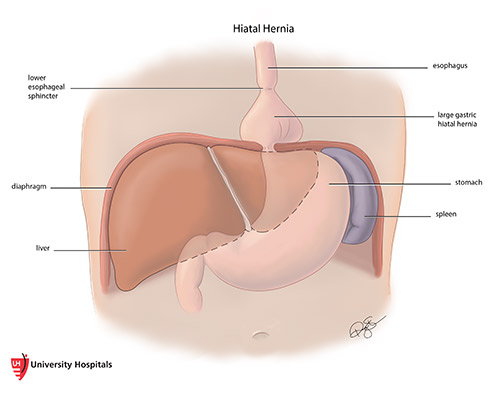UH Digestive Health Specialists Provide Expert Care for Hiatal Hernias
Hernia is a very general medical term used when an organ or tissue protrudes through the wall of the bodily structure in which it is normally contained. A hiatal hernia occurs when the upper part of the stomach pushes up through the diaphragm and into the chest region. The diaphragm is a large muscle that separates your abdomen and chest and includes an opening through which the aorta, esophagus (food pipe) and other vital structures pass through. This opening is called the hiatus.
Your health is important. Get expert care.
To schedule an in-person or virtual consultation with a UH digestive health specialist, call 1-866-UH4-CARE.
Find a DoctorA hiatal hernia occurs when the diaphragm muscle becomes weakened and allows your stomach and other abdominal organs to bulge up through the hiatus. It’s not always clear why this happens, but potential causes include:
- Age-related changes in your diaphragm (hiatal hernias are most common in people 50 and older)
- Being overweight or obese
- Scoliosis or other spine conditions that change the anatomy of the diaphragm
- Injury to the area, for example, after trauma or certain types of surgery
- Being born with an unusually large hiatus
- Persistent and intense pressure on the surrounding muscles, such as while coughing, vomiting, straining during a bowel movement, exercising or lifting heavy objects
Medical and Surgical Management of Hiatal Hernias
Symptoms of a hiatal hernia may include heartburn, chest pain, belching or difficulty swallowing. Often, these symptoms can be treated with medications and/or lifestyle modifications. In some rare cases, a hiatal hernia may cause dangerous symptoms such as bleeding, scarring, ulcers or narrowing of the esophagus. In cases such as this, surgery may be recommended. During the procedure, the stomach is pulled back into its proper place and the hiatus is made smaller and tighter to avoid future herniation. Surgical mesh will sometimes be used to reinforce the repair. The stomach may also be stitched to tissue in the abdomen to prevent it from moving upwards during the healing period.
Hiatal hernia repair surgery may be done in one of two ways:
- Laparoscopic or Robotic surgery
-
The surgeon conducts the procedure through several very small incisions in the abdomen using instruments equipped with cameras that enable him/her to see inside your body. This is a minimally invasive procedure that usually results in less pain after the operation, a shorter hospital stay and a faster recovery.
- Open surgery
-
Most hernia repairs can be done with a minimally invasive approach. However, in some cases your surgeon may determine that an open procedure is necessary. This involves a larger, single incision in the chest or abdomen and results in a longer recovery period and more time spent in the hospital.
Preparing for Hiatal Hernia Repair Surgery
Prior to hiatal hernia surgery, your doctor may confirm the diagnosis by ordering an esophagram – an imaging study of the esophagus, using X-rays and a contrast agent, usually barium. This exam is sometimes called a “barium swallow.” Your doctor will tell you how to prepare for this test. Additional studies that may be performed before surgery include an upper endoscopy and an esophageal motility study.
Life after a Hernia Repair
Hernias can recur after surgery. To reduce this risk, you should make every effort to maintain a healthy weight and avoid heavy lifting and any activities that put excess strain on your abdominal muscles. It is also recommended that you eat a high fiber diet to help keep stools soft and avoid the need to strain during bowel movements.
Your health is important. Get expert care.
To schedule an in-person or virtual consultation with a UH digestive health specialist, call 1-866-UH4-CARE.



